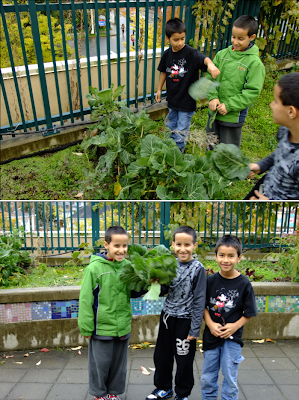Here's a video of our coordinator (Steph) speaking at the October 12 "Our Neighbourhoods, Our Food" event at the Roundhouse Community Centre. Erin Kastner from the Vancouver Fruit Tree Project gives a thoughtful introduction.
Here's half a year's review of our activities in pictures. Blogger's formatting isn't really cooperating so the text and pictures may not match up on some computers. We're sorry about that and we're working on resolving this issue this year...meanwhile, please enjoy!

Norquay Community Learning Orchard (August 9, 2011).

Jason at the Cheyenne Avenue Community Garden about a year after we began converting the empty lot that used to be here.

An abundance of shiso, scallions, chard, and other delights.

Adding lemon juice to a pint jar at a tomato-canning workshop. It is generally considered safe to can tomatoes in a boiling water bath (rather than a pressure canner) as long as you add lemon juice. This ensures sufficient acid content to deter bacterial growth.

Summer practicum student Melanie working in the corn patch on the Rooftop Garden.

A hefty dose of chicken manure from a local farm gave us an abundance of leafy greens this year. Kale seedlings donated by volunteer Teemuz Arsiray flourished all summer and fall.

Black patches on tomato stems are a sure sign of blight. Blight is a type of fungus that can easily infect tomato plants in our rainy coastal climate. Crop rotation and growing tomatoes under cover can help prevent the spread of this disease.

Tomatillos. Native to Mexico and Guatemala, the tomatillo was used as a food plant by the Aztecs and is still an important ingredient today. The plants are not very self-fertile, meaning if you have less than two in the garden, your yields will be quite low.

Gardeners' potluck picnic at the Collingwood Community Gardens.

Summer salsa workshop at Renfrew Community Centre.

More summer salsa at Renfrew.

Volunteers creating planters out of recycled plastic and burlap bags (bags donated by Ethical Bean Coffee).


Rooftop beans.

Green zebra tomatoes.

We plant plenty of flowers to entice bees and other pollinators to spend time on the Rooftop Garden.

Ruby orach seeds. Orach (sometimes called Mountain Spinach) tastes a lot like kale. Kids' Kitchen participants discovered that it's delicious in lasagna.

Tomatillo flowers turned out to be very popular with bumblebees.

Borage and Asian greens in the background (a few minutes before we pulled them out to make room for lettuce). Bees are crazy about borage. They can't get enough of it.

Cornflowers (also called Bachelors' Buttons) are pretty additions to salads. A wildflower native to Western Europe, cornflowers are endangered there because of intense herbicide use. In France they're used to commemorate the 1918 Armistice (in Canada we use poppies instead).

Bok choy and arugula flowers make a flavourful addition to salads.

Slugs hiding in the lettuce patch. Yuck.

Summer harvest fun!

Harvesting leeks. Turned out some of the leeks were quite tough, so we blanched them before stir-frying them at Community Kitchen.

Community kitchen.


Kohlrabi growing at Collingwood Community Gardens.

Cleaning up after a plum jam workshop.

Harvest Fair entry for "Craziest Carrot."

Cassandra volunteering at our information booth at the Harvest Fair in Slocan Park (hear Cassandra speaking about the Youth Food Policy Council by clicking on the link below)

Local politicians Adrian Dix (MLA) and Dr. Kerry Jang (Deputy Mayor) judging entries at the Havest Fair...in consultation with local residents, of course!

Some of our proud competition winners.

In 2011, Collingwood Neighbourhood House celebrated its 25th anniversary. We celebrated by planting fruit trees in Gaston Park to honour our major supporters over the years.

Working together to plant the trees. We selected trees to reflect our community's diverse food traditions. We included quince, Asian pear, Italian plum, apples, cherries, and Saskatoon berries.

Asian pear tree came free with Asian pear!

Food Skills for Families pilot program for seniors.

Harvesting collard greens for community kitchen.

Cleaning out the mason bee house. We'll be posting a separate entry about mason bees with more detailed pictures in the springtime.

Students from the Collingwood ABE program after cooking up their first (amazing!) fundraiser luncheon, along with their teaching assistant Pearl, and volunteers Barry and Najia.

Food Skills for Families Seniors pilot program.

Very serious times at the pears in syrup canning workshop.

Smelling garden fresh sorrel at community kitchen.

Sorrel soup in progress.


Purple tomatillo bush growing wild at the Norquay Community Learning Orchard--the product of a 2010 seed bombing mission.

Planting grape and kiwi vines at the orchard.

Food Skills for Families pilot caregivers' edition.

Community Lunch volunteers Crecien and Karen.

Community Lunch holiday celebration supported by many local volunteers and musicians of all ages.

No comments:
Post a Comment